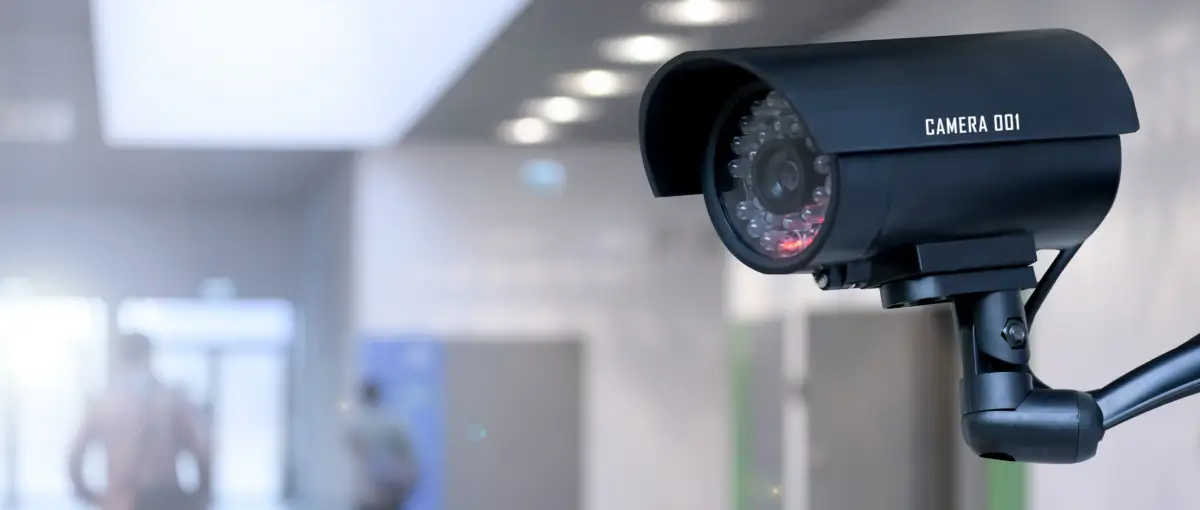Nobody likes someone watching over their shoulder. While you might lock your digital doors to keep out hackers and cybercriminals, have you considered that the company you spend eight hours a day with might already be peering over your virtual shoulder?
In 2024, workplace surveillance has evolved far beyond security cameras and call monitoring. Now, we face keystroke logging, website tracking, social media monitoring, and chat log recording. Surveillance in the modern workplace would make Ian Fleming, author of the James Bond series, do a double-take.
So we went incognito to survey the surveilled and ask employees a few questions behind their boss's backs. Our reconnaissance mission found the ways by which U.S. and U.K. employees think they’re being tracked. We also collected the raw emotional responses that employees have about it, which we provide to you here, uncensored.
We surveyed 2,006 full-time American and British employees with bosses to find all the ways they are surveilled, how transparent their bosses are about it, how much it negatively affects mental health, how opposed employees are to it, and how they try to avoid it. Read on to get the latest intel!
Key takeaways
- Over one-third of workers say workplace surveillance hurts mental health.
- In the U.K., 71% of workers say work surveillance is unethical.
- Surveillance decreases job satisfaction, say 3 in 4 workers.
- Of all employees surveyed, 47% think their bosses are fully transparent about surveillance.
- Email and chat monitoring is the #1 surveillance method.
Levels of surveillance in the U.S. and U.K.
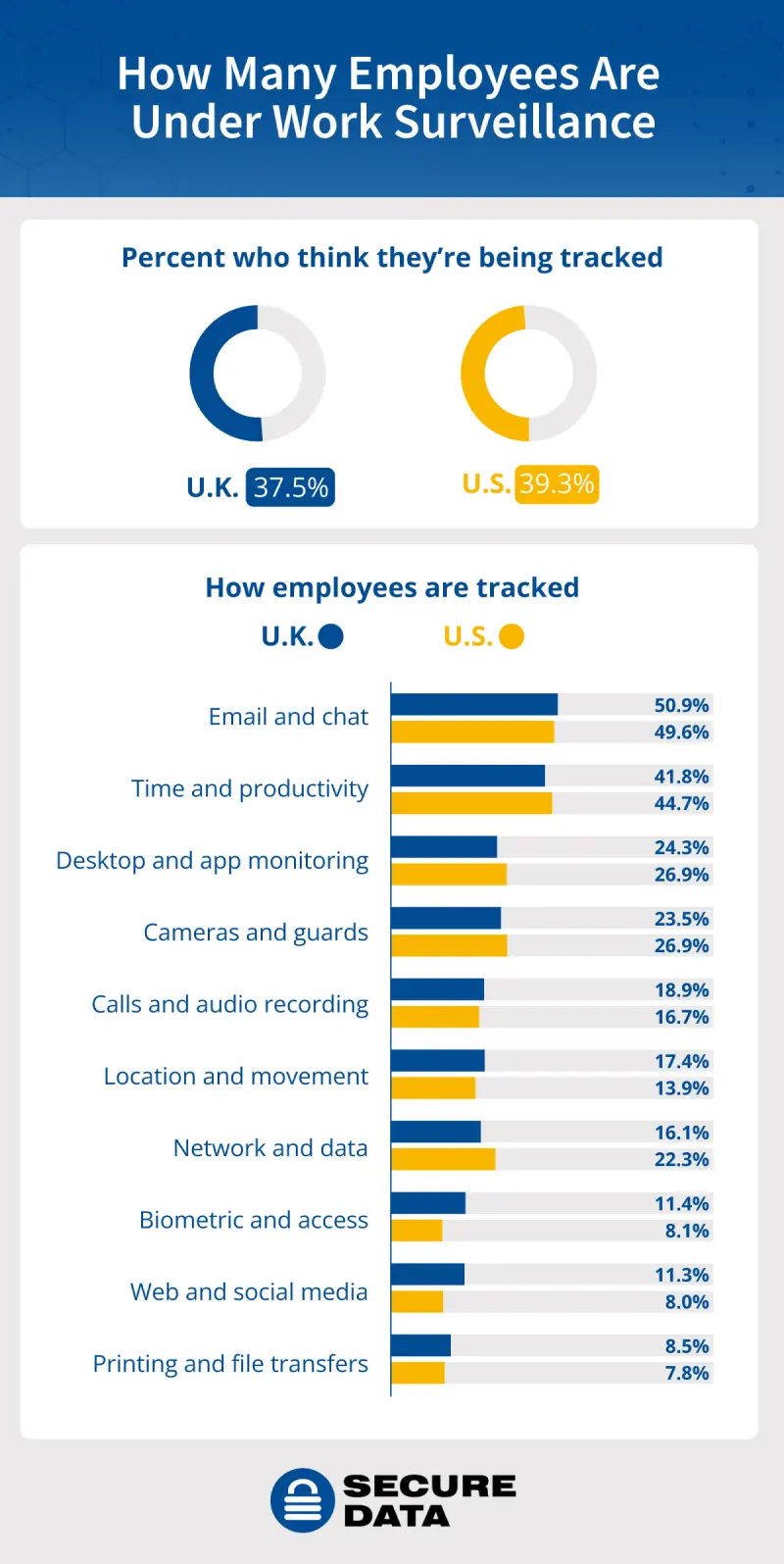
Our first mission was to find all the ways bosses track their employees in the U.S. and U.K. We rounded up the ten most common tracking methods and asked our respondents to report which methods they are aware of their bosses using. Overall, just over a third of all respondents from both countries report being under some form of surveillance at work.
Our study found that the most commonly used methods are mainly related to digital rather than physical surveillance. Tracking email and chat records like Gmail, Microsoft Teams, or Slack is the #1 surveillance method in the U.S. and U.K., with half of the employees reporting it.
On the other hand, physical surveillance techniques like biometrics and access tracking, such as badge scanners and visitor logbooks, are used less frequently in both countries. They’re the #8 most used method. Other location and movement tracking forms, like GPS and RFID tags, are also lower on the list. They are the #7 and #6 most used methods in the U.S. and U.K., respectively.
Time and productivity tracking is the #2 most used surveillance method. It is a less invasive form but still a surveillance technique. Time and productivity tracking is the process of capturing and analyzing the day-to-day completion of work by required self-reporting or utilization of time-tracking software. This method is #2 in both countries, with an average of 43% reporting it.
Overall, the U.S. and the U.K. have extraordinarily similar work surveillance practices. The most remarkable difference between the two countries is that the rate at which the U.S. uses network and data tracking methods is 39% higher than that of the U.K.
Surveillance transparency in the workplace
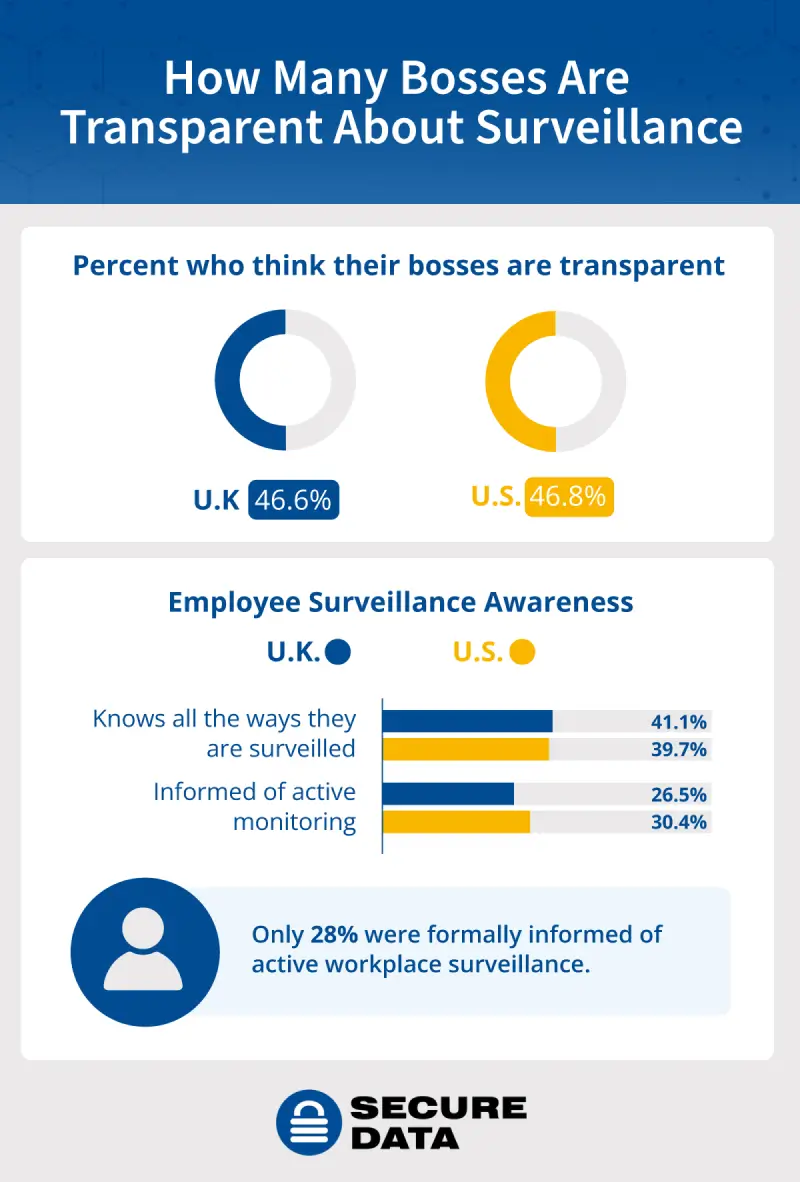
The true surveillance levels in the U.S. might also be higher than reported here. That is because, under federal legislation, bosses in most of the U.S. have no legal requirement to disclose to their workers that they are being monitored. It’s a little different in the U.K., where bosses must tell workers how they are being surveilled and what is being tracked or collected.
So, we set out to find out how transparent bosses are with their workers in both countries and compare the results, keeping these different legalities in mind.
Interestingly, both countries have identical transparency rates. Roughly 47% of workers surveyed likely work under bosses who are transparent about their surveillance methods. More specifically, 2 in 5 respondents in both the U.S. and the U.K. think they know all the ways their bosses track them.
Regarding formal disclosure, the results somewhat contrast with what the different laws in these countries might suggest. Interestingly, 30% of U.S. and only 27% of U.K. workers were formally informed of active monitoring at their workplace.
Nevertheless, the U.K. responses are more concrete since U.K. law mandates that bosses disclose surveillance to workers. So, regarding surveillance in the U.S., these identical surveillance findings could mean bosses in the U.S. are largely transparent about surveillance, regardless of the law. It also could mean the U.S. has a workforce that is very perceptive of when they are under surveillance. Finally, U.S. workers could be overly confident about surveillance transparency, and these rates are actually much lower than in the U.K.
Mental health consequences of surveillance
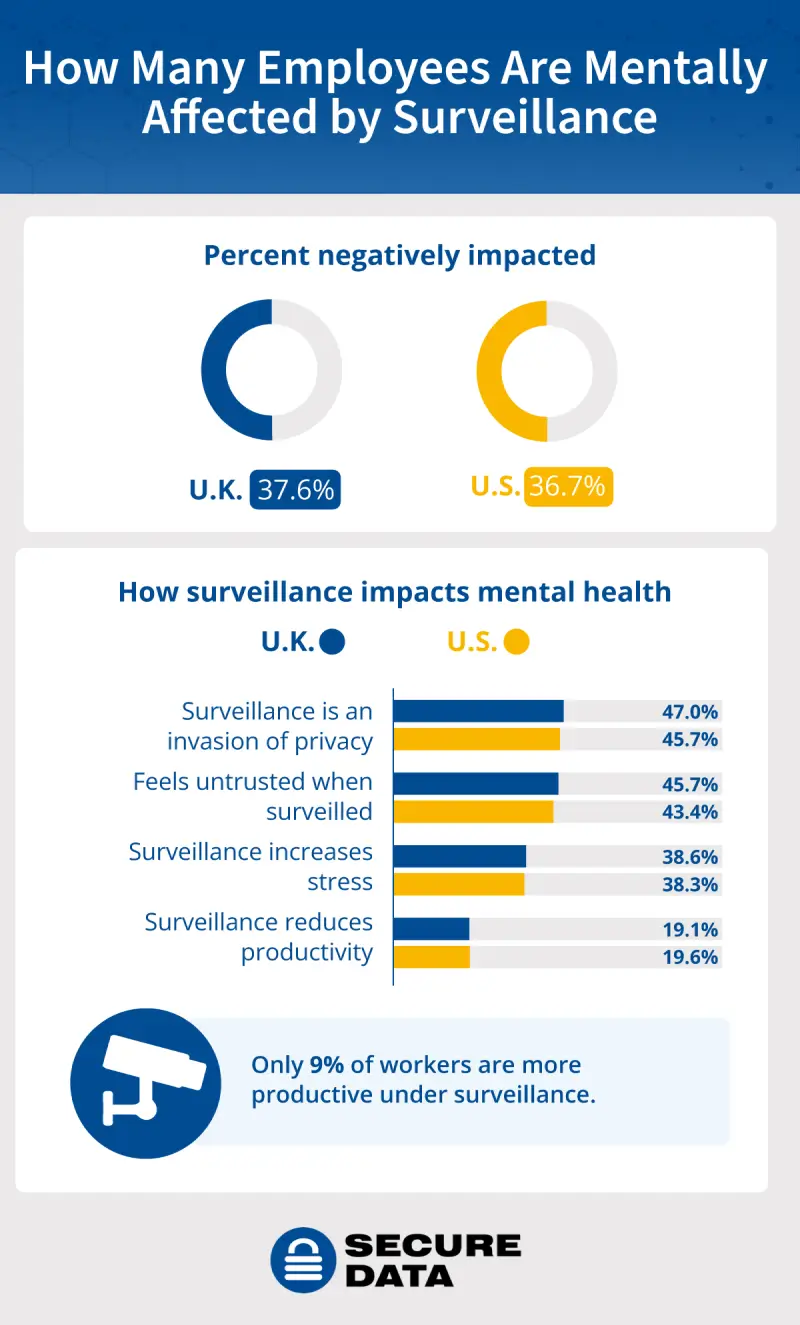
Our next task was to measure the mental health consequences of workplace surveillance. Over one-third of all respondents report some form of negative mental health consequences from surveillance.
We looked at four key areas to measure the impact of surveillance on worker mental health: stress, privacy, trust, and productivity.
The #1 impact for both countries is that work surveillance feels like an invasion of privacy. Just under half of both countries report feeling this way. The #2 impact is on trust. Nearly half of the respondents say that active surveillance makes them feel untrusted. The rates are almost identical for both countries.
It doesn’t just feel like an invasion of privacy to some workers or that they are untrusted — 38% overall say surveillance increases their stress levels. Higher stress can affect productivity, and while the goals of workplace surveillance are usually to monitor how effectively workers do their jobs, our results find that it can actually have a negative impact.
Only 1 in 10 workers admit they complete more work under surveillance than without. However, twice the respondents report being less efficient when under surveillance. Higher stress levels from surveillance could play a role in that.
In total, 40% said workplace surveillance does not affect how much work they complete. When it comes to the point of workplace surveillance — productivity — these results call into question the value of the practice.
Employee opposition to surveillance
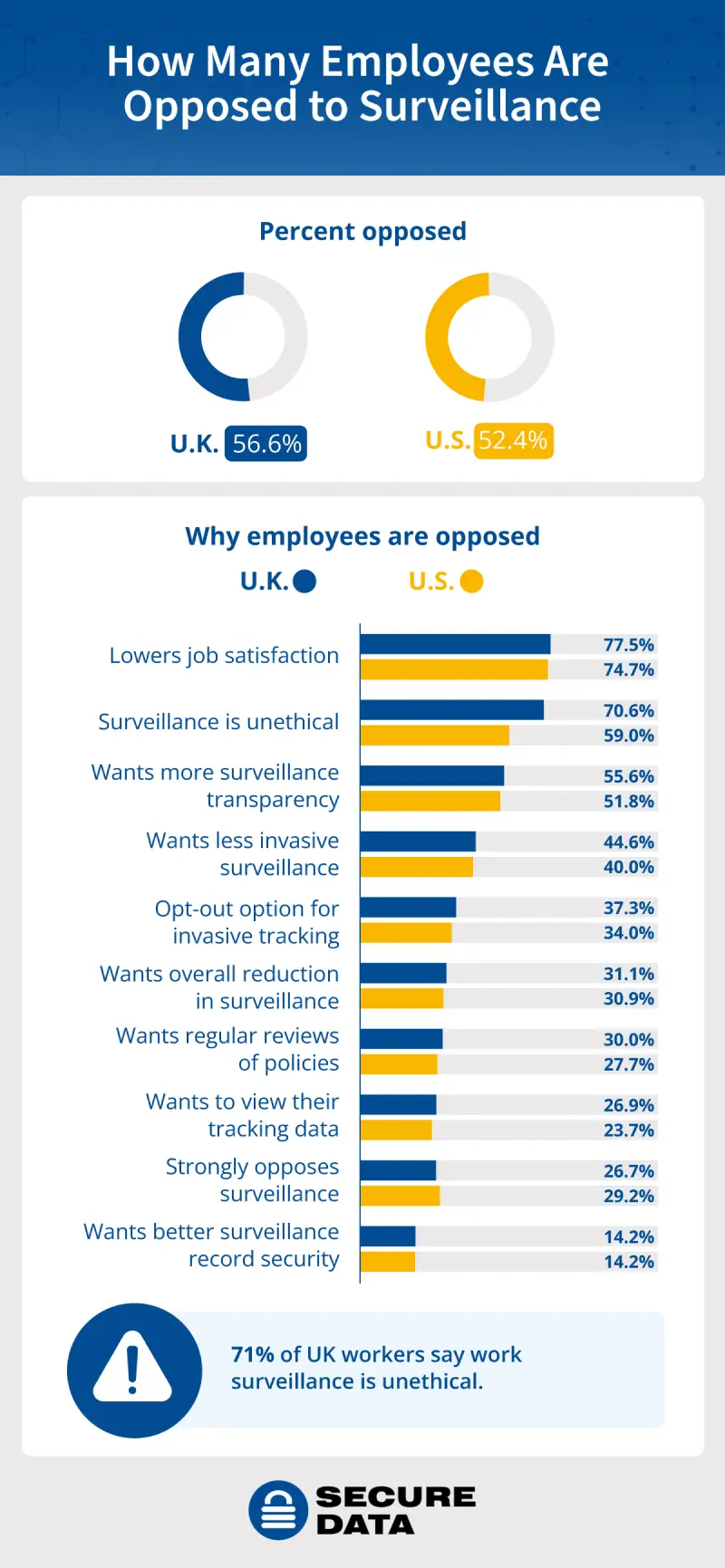
It would be natural to assume that most employees are opposed to workplace surveillance, but our findings suggest it is quite tolerated in both countries. Overall, just over half of employees in the U.S. and U.K. are opposed to workplace surveillance for some specific reason.
We get a range of responses when we look at the individual reasons why employees are opposed. First, just over 3 in 4 respondents said surveillance lowers job satisfaction. Out of every question in our survey, this sentiment is one of the few that such a large majority of employees agree on.
The #2 most agreed-upon sentiment is that surveillance is unethical, regardless of the law. Here, we also find the greatest differences between the U.S. and the U.K. Roughly 71% of U.K. workers say surveillance is unethical, while only 59% in the U.S. say the same.
The legal differences between the two countries could be a factor here. U.K. surveillance laws are more favorable to employees than U.S. laws. Where many employees in the U.S. are stuck wondering if they are being tracked in the first place, U.K. employees generally know if they are or not and can move past that question and onto the question of ethics.
Regardless, even though the U.K. has more employee-friendly laws about surveillance transparency, over half of the employees from the U.K. and the U.S. want more transparency. So, while U.K. laws are more favorable to employees, many in the U.K. feel they need to go further.
Increased transparency can be more than just telling workers they are tracked. For example, 1 in 4 respondents want an option to view the tracking data their bosses record. U.K. workers already have this right to access through a subject access request (SAR), but bosses can refuse these requests if they find them unfounded or excessive, which is open to some interpretation.
How employees avoid surveillance
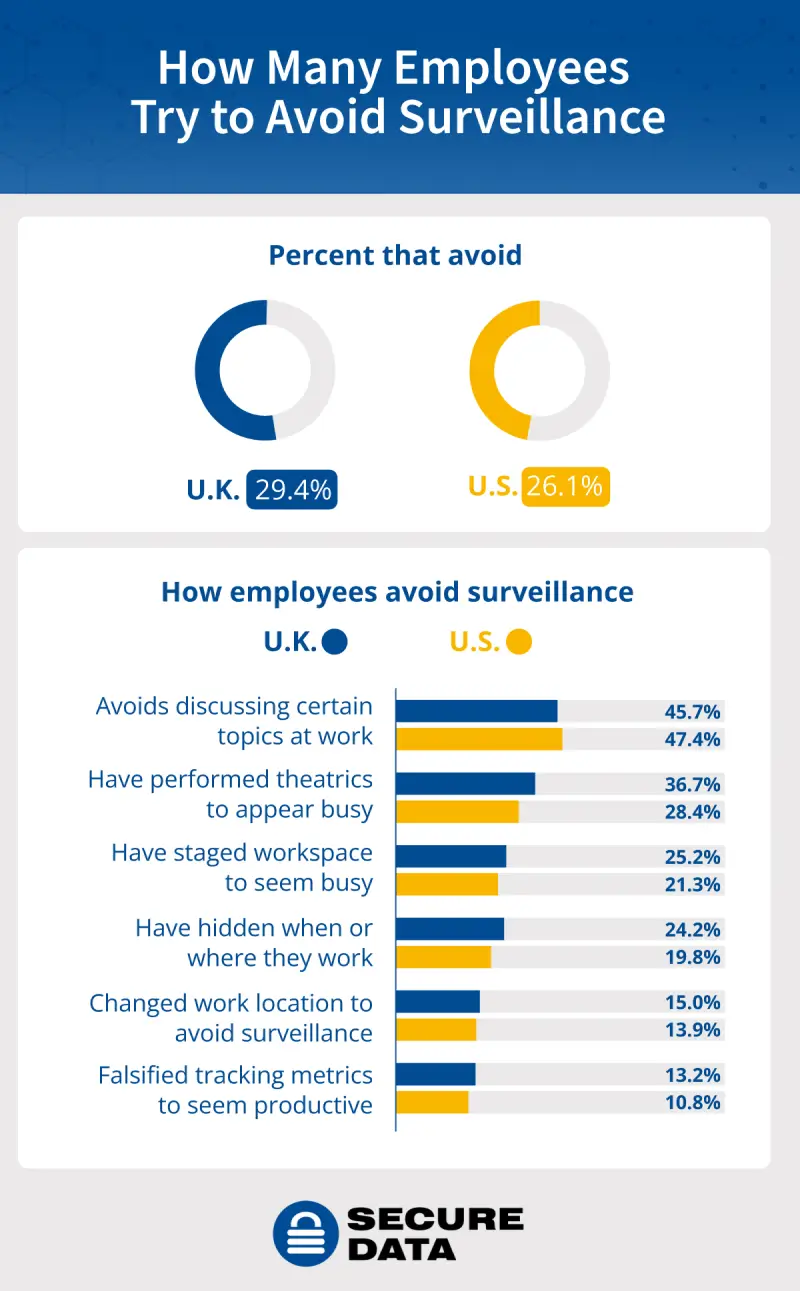
Our final mission in evaluating the culture of workplace surveillance was to discover all the ways employees try to avoid monitoring at work. Evasive maneuvers range from the benign to the more dramatic acts.
The #1 maneuver workers use to circumvent surveillance at work is to avoid discussing certain topics in the workplace. Just under half of all respondents report engaging in this avoidance behavior. The #2 most common avoidance technique is to add behavior rather than subtract, which has 37% in the U.K. and 28% in the U.S. engaging in theatrics to appear busier than they really are. For example, waxing on to your boss that you are at your personal work capacity when you could take on more is an example of theatrics.
Outside of avoiding topics at work, most other common avoidance behaviors involve some additional effort by the employee. For example, 23% of all respondents have staged their workspaces to appear like they are working when they are not. An example of this avoidance method, coming in at #3, is spreading reports and notes out on your desk or having multiple applications and windows open on your computer, all to give the appearance that you are deep in your work.
These results raise questions about the value of workplace surveillance to employers, even when putting mental health consequences or opposition to surveillance aside. Just over 1 in 4 U.S. and U.K. workers engage in surveillance avoidance, with many techniques requiring effort. Additionally, 19% of employees reported a loss of productivity from surveillance, with only 9% saying they gained in productivity.
Surveillance tracking costs for employers can vary greatly. However, when factoring in the additional “costs” of surveillance, such as wasted energy and time on avoidance or productivity loss from stress or other reasons, the most expensive tracking methods, like network and data monitoring or RFID tags, might be less cost-effective after all.
Secure your data like a boss
Even if you are not an employer keeping 007-like records of your employees, your personal device data is a log of your life. From precious photos, essential files, and contact information, protecting your devices from unwanted viruses and malware agents is more crucial than ever.
However, should your files become compromised and your data lost, there is no need to stress! At Secure Data Recovery, we have a team of experts trained in data recovery to help you restore lost photos, files, and more. Think of us as your personal Q Branch for all your 007 data needs. We are here to help with all your hard drive recovery or data recovery services!
Methodology
In April 2024, we conducted a cross-national survey engaging 2,006 residents, 998 in the U.S. and 1,008 in the U.K., to see how full-time employees with bosses in each country are surveilled and how they feel about it.
We surveyed respondents and grouped questions into five key indexes. (1) to measure all the ways they are surveilled, (2) how transparent their bosses are with them about surveillance, (3) the degree to which it negatively impacts their mental health, (4) how opposed they are to it, and (5) all the ways they try to avoid it. We used a point system to rank responses for each question, averaged the points across all applicable questions in a category, and then averaged those results by country to arrive at our overall Surveillance, Transparency, Mental Impact, Opposition, and Avoidance Levels.

